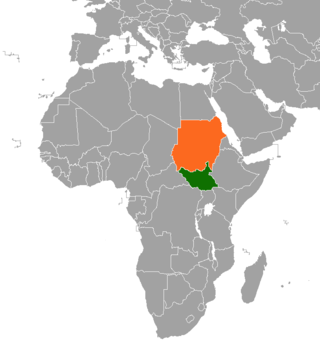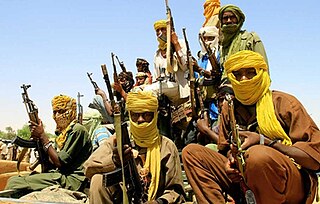
The War in Darfur, also nicknamed the Land Cruiser War, was a major armed conflict in the Darfur region of Sudan that began in February 2003 when the Sudan Liberation Movement (SLM) and the Justice and Equality Movement (JEM) rebel groups began fighting against the government of Sudan, which they accused of oppressing Darfur's non-Arab population. The government responded to attacks by carrying out a campaign of ethnic cleansing against Darfur's non-Arabs. This resulted in the death of hundreds of thousands of civilians and the indictment of Sudan's president, Omar al-Bashir, for genocide, war crimes, and crimes against humanity by the International Criminal Court.

In May 2008, the Justice and Equality Movement (JEM), a Darfur ethnic minority rebel group, undertook a raid against the Sudanese government in the cities of Omdurman and Khartoum.

Sudanese nomadic conflicts are non-state conflicts between rival nomadic tribes taking place in the territory of Sudan and, since 2011, South Sudan. Conflict between nomadic tribes in Sudan is common, with fights breaking out over scarce resources, including grazing land, cattle and drinking water. Some of the tribes involved in these clashes have been the Messiria, Maalia, Rizeigat and Bani Hussein Arabic tribes inhabiting Darfur and West Kordofan, and the Dinka, Nuer and Murle African ethnic groups inhabiting South Sudan. Conflicts have been fueled by other major wars taking place in the same regions, in particular the Second Sudanese Civil War, the War in Darfur and the Sudanese conflict in South Kordofan and Blue Nile.

The Sudanese conflict in South Kordofan and Blue Nile was an armed conflict and insurgency in the Sudanese states of South Kordofan and Blue Nile between the Sudanese Armed Forces (SAF) and the Sudan People's Liberation Movement–North (SPLM-N), a northern affiliate of the Sudan People's Liberation Movement (SPLM) in South Sudan. After some years of relative calm following the 2005 agreement which ended the second Sudanese civil war between the Sudanese government and SPLM rebels, fighting broke out again in the lead-up to South Sudan independence on 9 July 2011, starting in South Kordofan on 5 June and spreading to the neighboring Blue Nile state in September. SPLM-N, splitting from newly independent SPLM, took up arms against the inclusion of the two southern states in Sudan with no popular consultation and against the lack of democratic elections. The conflict is intertwined with the War in Darfur, since in November 2011 SPLM-N established a loose alliance with Darfuri rebels, called Sudan Revolutionary Front (SRF).
Yarmouk Military Industrial Complex (YIC), also known as the Yarmouk Munitions Factory, is a military complex located in Khartoum, the capital of Sudan.

The Rapid Support Forces is a paramilitary force formerly operated by the government of Sudan. The RSF grew out of, and is primarily composed of, the Janjaweed militias which previously fought on behalf of the Sudanese government. Its actions in Darfur were deemed crimes against humanity by Human Rights Watch.
The following lists events that happened during 2011 in Sudan.
The 2019–2022 Sudanese protests were street protests in Sudan which began in mid-September 2019, during Sudan's transition to democracy, about issues which included the nomination of a new Chief Justice and Attorney General, the killing of civilians by the Rapid Support Forces (RSF), the toxic effects of cyanide and mercury from gold mining in Northern state and South Kordofan, opposition to a state governor in el-Gadarif and to show trials of Sudanese Professionals Association (SPA) coordinators, and advocating the dismissal of previous-government officials in Red Sea, White Nile, and South Darfur. The protests follow the Sudanese Revolution's street protests and civil disobedience of the early September 2019 transfer of executive power to the country's Sovereignty Council, civilian prime minister Abdalla Hamdok, and his cabinet of ministers. Hamdok described the 39-month transition period as defined by the aims of the revolution.
The following lists events during 2023 in the Republic of the Sudan.

A civil war between two major rival factions of the military government of Sudan, the Sudanese Armed Forces (SAF) under Abdel Fattah al-Burhan and the paramilitary Rapid Support Forces (RSF) and its allies under the Janjaweed leader Hemedti, began during Ramadan on 15 April 2023. Three minor (neutral) factions have also participated in the fighting: the Darfur Joint Protection Force; the SLM (al-Nur) under Abdul Wahid al-Nur; and the SPLM-N under Abdelaziz al-Hilu. Fighting has been concentrated around the capital city of Khartoum and the Darfur region. As of 14 November 2024, at least 61,000 people had been killed in Khartoum State alone, of which 26,000 were a direct result of the violence. As of 5 July 2024, over 7.7 million were internally displaced and more than 2.1 million others had fled the country as refugees, and many civilians in Darfur have been reported dead as part of the Masalit massacres.

The battle of Khartoum is an ongoing major battle for control of Khartoum, the capital city of Sudan, with fighting in and around the city between the paramilitary Rapid Support Forces (RSF), and the Sudanese Armed Forces. The battle began on 15 April 2023, after the RSF captured Khartoum International Airport, several military bases, and the presidential palace, starting an escalating series of clashes.
The following is a timeline of the Sudanese civil war (2023–present) in 2023.

The Battle of Nyala was a battle for control of Nyala, the capital of South Darfur in Sudan, between the paramilitary Rapid Support Forces (RSF), and the Sudanese Armed Forces during the ongoing Darfur campaign. The first battle occurred between 15 and 20 April 2023, during which hundreds were reported dead. A civilian-brokered ceasefire paused the fighting by April 20. Sporadic clashes broke out between May and July. In August 2023, the RSF launched an offensive on the city. The SAF launched air campaigns against the RSF in Nyala, with many civilian casualties in Taiba and El Matar. In late September, the RSF besieged the headquarters the SAF's 16th Infantry Division headquarters, capturing it on October 26.

The siege of El Obeid was a siege in El-Obeid, North Kordofan, Sudan, during the 2023 Sudan conflict. The battle began on April 15, and saw the Rapid Support Forces (RSF) capture the El Obeid airport from the Sudanese Army contingent in the city. Throughout April and May, the Sudanese Army repelled several RSF assaults on the city, although by May 30, the RSF fully surrounded the city and laid siege to it.

The Battle of Kutum was a conflict during the War in Sudan which occurred in and around the town of Kutum in North Darfur. The Rapid Support Forces quickly overran the city, and carried out massacres in the city and the neighboring Kassab IDP camp. The group then attacked neighboring villages in early June.

The civil war in Sudan, which started on 15 April 2023, has seen widespread war crimes committed by both the Sudanese Armed Forces (SAF) and the Rapid Support Forces (RSF), with the RSF being singled out by the Human Rights Watch, and the United Kingdom and United States governments for committing genocide, ethnic cleansing and crimes against humanity.
The following lists events during 2024 in the Republic of the Sudan.
The following is a timeline of the Sudanese civil war (2023–present) in 2024.
A series of air strikes are being conducted by the Sudanese Armed Forces (SAF) against positions of the Rapid Support Forces (RSF) across Sudan, resulting in a significant increase in the number of civilian deaths in the war. Civilian areas and RSF-held positions have been targeted by the SAF in North Darfur, North Kordofan, Gezira State, and White Nile State, resulting in an estimated death toll of 523 Sudanese civilians.
The following is a timeline of the Sudanese civil war (2023–present) in 2025.








